Finding the best plug-in hybrid executive cars - for less than £40k
BMW's electrified saloon meets Audi A3 Sportback e-tron, Volkswagen Passat GTE Estate and Volvo V60 D5 Twin Engine. What is the best sub-£40k PHEV?
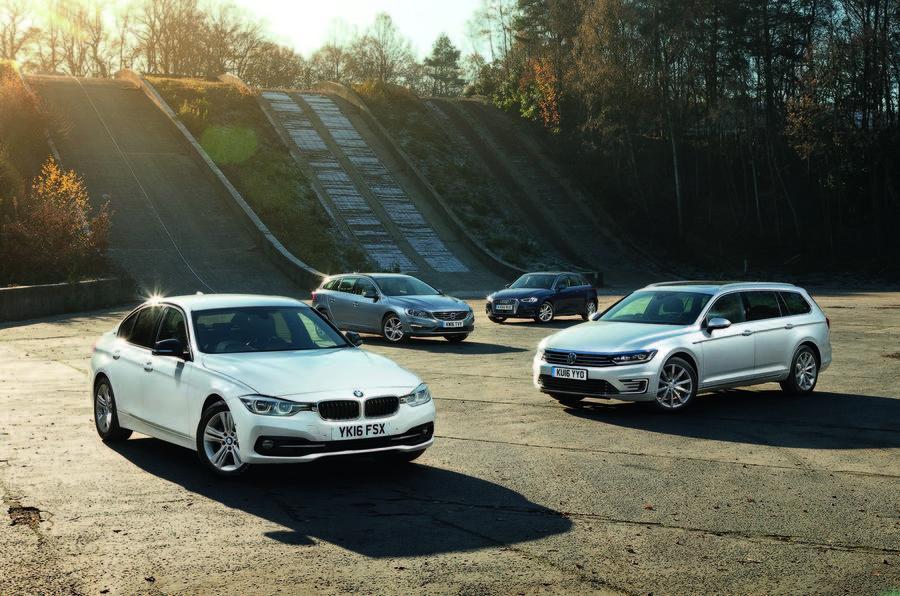
Plug-in hybrid (PHEV) execs have come a long way in the past couple of years. These curios have evolved from being a gimmicky business tax break to commonly seen hatchbacks, saloons, SUVs and estates that are cheap enough to make an appealing alternative to a higher-level conventional petrol or diesel.
An alternative, yes, but are PHEVs better than their piston-engined stablemates? To truly succeed in the real world, these hotbeds of technology need to be quicker, smoother, more efficient, more refined, more engaging to drive and easier to use than their simpler counterparts. Are they there yet? We’ve spent time in the latest sub-£40k plug-in hybrids from Audi, BMW, Volkswagen and Volvo to find out. Our test included plenty of back-to-back urban and motorway miles, lots of charging and zero-emissions running, real-world economy calculations and hard road driving.
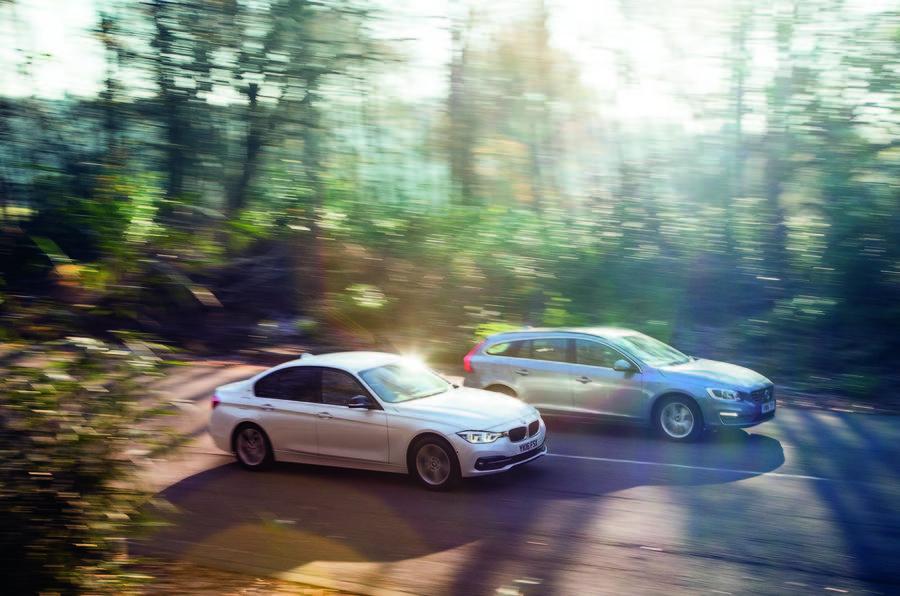
Incorporating a five-door hatch, four-door saloon and two mid-sized estates that cost between £34,000 and £39,000, our selection represent as fair a comparison as possible while showing the choice that already exists this marketplace.
Audi’s A3 Sportback e-tron is the smallest car on test, with the lowest CO2 emissions and kerbweight. The Volkswagen Passat GTE Estate is the newest, with the most powerful electric motor and the biggest boot. The Volvo V60 D5 Twin Engine treads its own path with a five-cylinder diesel and self-contained electric rear axle. And the BMW 330e simplifies things with an electric motor where its torque converter would usually be and the smallest drive battery here.
All are affordable, with business contract hire deals of around £400 a month, and savings of up to £200 a month on company car tax. So, which should you buy?
REAL-WORLD ECONOMY
Plug-in hybrids are designed for low-mileage drivers who live in an urban area within about 30 miles of their workplace. These owners need a somewhere to park and charge their PHEV at home and, ideally, at the office too. To best replicate this in context, we devised a 30-mile test route to drive our four rivals back-to-back – and we strove to determine once and for all what fuel economy they’ll really do, and if their claimed electric range is accurate. Given our cold, wintry test day, view our test results as conservative, as battery performance improves in warmer temperatures.
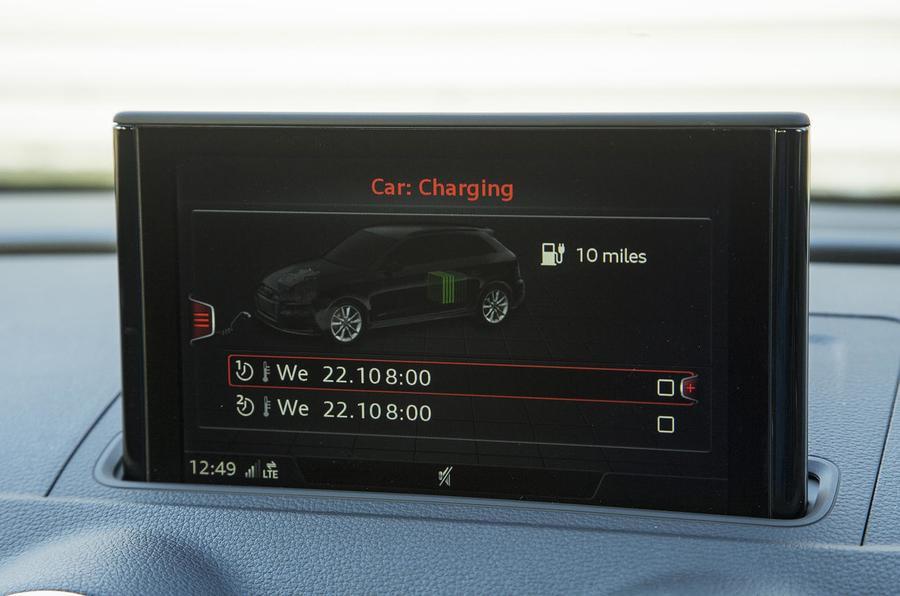
All PHEV contenders topped 80mpg. With the least capacious (7.6kWh) high-voltage drive battery here and, at 249bhp, the most powerful combustion engine, the 330e returned 80.4mpg. The Passat GTE Estate narrowly returned an indicated 81.7mpg, and the A3 e-tron, 86.5mpg. All three models have a similar four-cylinder petrol turbo and electric motor layout, but the Audi’s relatively low kerbweight pays dividends, as do the Volkswagen’s sophisticated driving controls such as easier and finer control over the motor’s freewheeling and battery-regen settings.
Surprisingly, the ageing five-cylinder diesel in the oldest car here gave the V60 Twin Engine the edge. Its biggest drive battery (11.2kWh) plus direct-drive, rear-feeding transmission for its electric motor helps make it feel more like a pure EV than any of its rivals. The Volvo returned 153.8mpg, almost twice that of the next best car.
When rating zero-emissions cruising range, it wasn’t quite the same order of merit. The 330e managed 13 miles before the piston engine kicked in; the V60 ran for 23 miles. The mid-ranking Audi and VW reversed their previous positions, the A3 running for 14 miles on battery power alone and the Passat for 17.
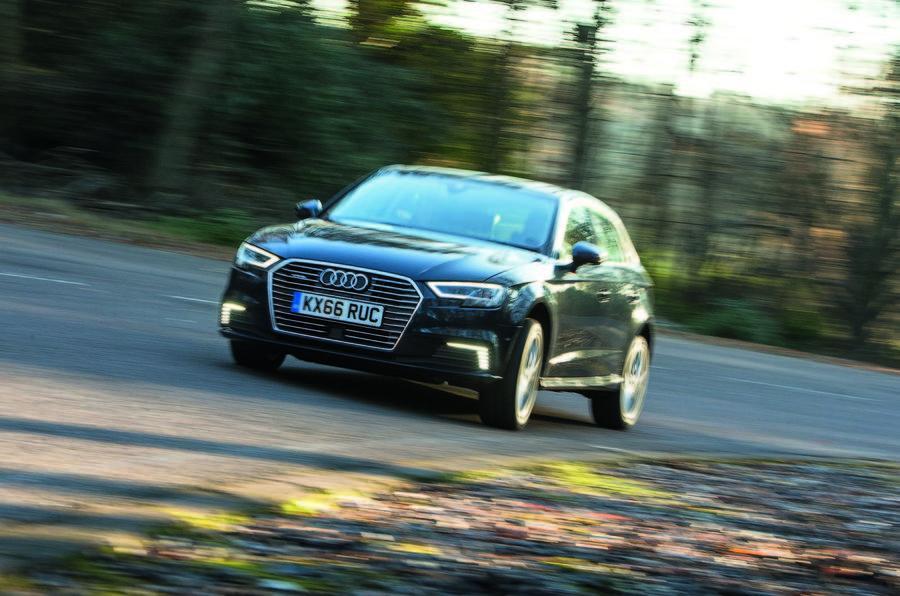
Combustion-engine-only 70mph touring economy sees the Volvo return 50.1mpg, the Audi 47.9mpg, the BMW 44.6mpg and the VW 42.2mpg. Even the lowest economy here is still pretty close to a diesel’s return.
INTERPRETING THE FIGURES
You may be a bit number blind by now, but bottom line is, if real-world economy and reduced emissions are your chief priorities, the electrified V60 Twin Engine comes out on top. But does that mean it wins our test?
From the slightly restricted, high-set driving position to the infotainment to the dash layout, the Volvo is beginning to feel old, which isn’t the best attribute when buying a new car. The BMW is only a few years younger, but it seems much fresher due not least to that optional 8.8in Professional Media infotainment screen. For premium-branded cabin ambience and quality feel, though, the smart Audi and VW win out.
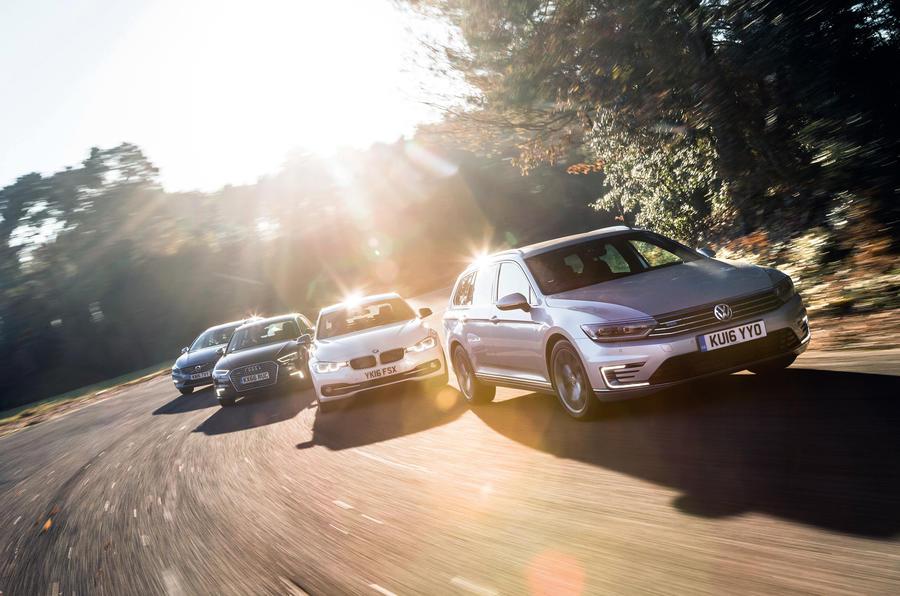
Comparative practicality relates directly to the models’ respective bodystyles, so is perhaps a little pointless to labour upon. The 330e and A3 e-tron are the least spacious here, the Passat GTE Estate the most useful by a distance. The Volvo doesn’t quite live up to the promise of its family-wagon looks, with its surprisingly limited back seats and – thanks to electric rear axle intrusion – boot. Meanwhile, what does the Audi no favours is that this compact five-door hatch is priced nearer its bigger saloon and estate rivals. That’s a big price to pay for its relative practicality compromises.
On the road, the V60 has a superbly refined, linear and precise accelerator response in town and up to about 50mph. The Passat GTE comes close, being only slightly less responsive and relaxing in EV mode and having the most electric propulsion. The A3’s hybrid powertrain is nearly as good but is less cleverly instrumented and controlled with a less powerful electric motor. Meanwhile, there’s a slightly odd hesitation in acceleration when the 330e is in EV mode.
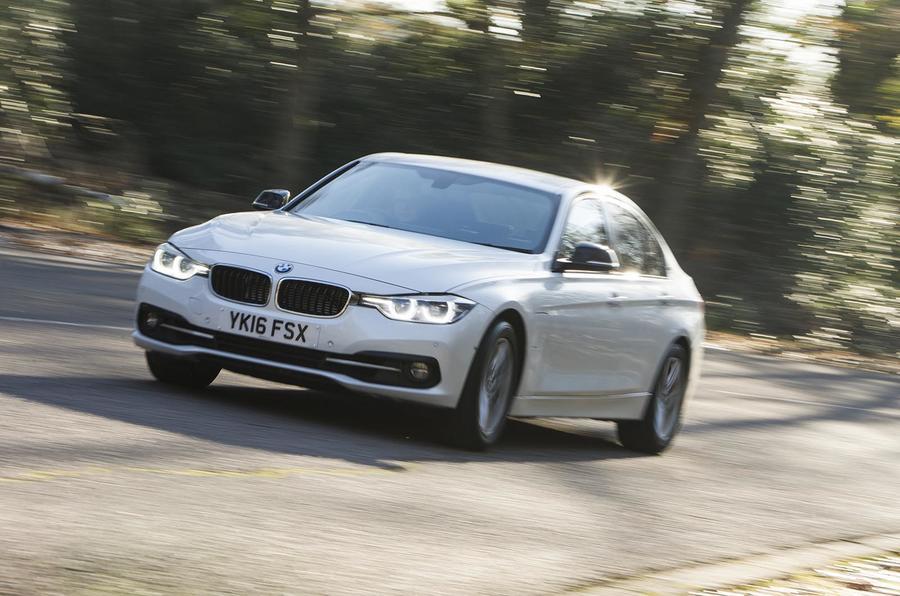
The picture changes when we consider broader performance and handling. The Volvo’s diesel changes the car’s character entirely when it cuts in, feeling noisy, rough and antiquated, if providing plenty of muscle. On high-speed country roads, the V60’s heavy weight shows in its increasingly leaden steering, clunky ride and loose body control.
The A3 and the Passat’s ride and handling are more competent. A slightly brittle ride and over-assisted steering take the edge off the Audi’s dynamic appeal, while the VW better combines low-speed comfort with high-speed composure. Both are refined, fairly brisk, flexible and free-revving, and they have identical 0-62mph acceleration times. However, neither leaves a lasting impression on its driver.
Finally, the 330e delivers a rewarding, sweeter-than-sweet drive; you can simply forget about the electrified part of the powertrain and drive it keenly, like you would any other BMW. The hybrid’s torquey and super-flexible delivery is smooth, uncontrived and natural even at full power. It even sounds good. The German model’s steering is positive and uncorrupted, its grip levels perfectly balanced and its body control well judged.
It’s this compelling driving experience that helps the BMW win out here. The 330e’s also the cheapest contender in our test, with the strongest performance, great cruising manners, commendable usability and competitive real-world efficiency. In the wider context, this model feels like it might genuinely be the best 3 Series available. PHEVs certainly have come on a long way.
BMW 330e Sport
Price £34,235
Engine 4 cyls, 1998cc, turbo, petrol, plus 87bhp electric motor
Drive battery 7.6kWh, lithium ion
Electric range 23.0 miles
Power 249bhp
Torque 310lb ft
Gearbox 8-spd automatic
Kerbweight 1660kg
0-62mph 6.1sec
Top speed 140mph
Economy 148.7mpg (combined)
CO2/tax band 45g/km, 7%
Volkswagen Passat GTE Estate
Price £38,325
Engine 4 cyls, 1395cc, turbo, petrol, plus 113bhp electric motor
Drive battery 9.9kWh, lithium ion
Electric range 31.0 miles
Power 215bhp
Torque 295lb ft
Gearbox 6-spd dual-clutch automatic
Kerbweight 1735kg
0-62mph 7.6sec
Top speed 140mph
Economy 166.0mpg (combined)
CO2/tax band 39g/km, 7%
Volvo V60 D5 Twin Engine SE Nav
Price £38,305
Engine 5 cyls, 2400cc, diesel, plus 67bhp electric motor
Drive battery 11.2kWh, lithium ion
Electric range 31.1 miles
Power 228bhp
Torque 457lb ft
Gearbox 6-spd automatic
Kerbweight 1988kg
0-62mph 6.9sec
Top speed 130mph
Economy 156.9mpg (combined)
CO2/tax band 48g/km, 7%
Audi A3 Sportback e-tron
Price £35,930
Engine 4 cyls, 1395cc, turbo, petrol, plus 101bhp electric motor
Drive battery 8.8kWh, lithium ion
Electric range 29.8 miles
Power 201bhp
Torque 258lb ft
Gearbox 6-spd dual-clutch automatic
Kerbweight 1540kg
0-62mph 7.6sec
Top speed 138mph
Economy 166.2mpg (combined)
CO2/tax band 38g/km, 7%
Sarah Bradley is a writer for AutoCar.
Join our commenting forum
Join thought-provoking conversations, follow other Independent readers and see their replies
Comments
Bookmark popover
Removed from bookmarks